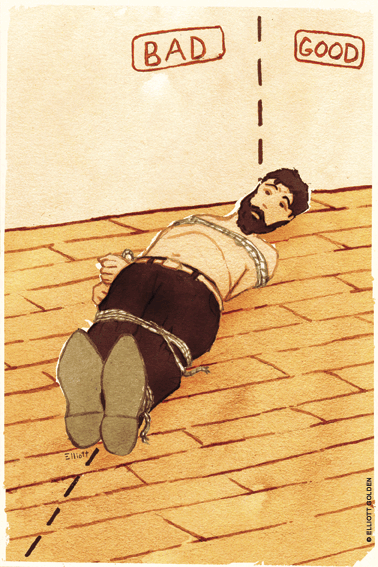
Dr. Peter Singer, the controversial ethics philosopher and professor of bioethics at Princeton University, spoke at Penn last semester on a wide variety of issues, many of them connected with free speech. He also received the first Scott Nearing Award for Courageous Scholarship from the political-science department’s Graduate Student Association; the award is named for the Wharton assistant professor who was dismissed in 1915 for his socialist-leaning politics [“An Affair to Remember,” March/April 2002].
During the question-and-answer session that followed his talk, Singer (who stands in the utilitarian tradition of ethics) was asked about the ethics of torturing a person suspected of being a terrorist, and gave the following response:
“Once we start having a debate about torture, people always say—of course they’ve said this long before 9/11—‘What if you’ve got a terrorist who has planted a nuclear bomb in a Manhattan basement, and you only have a few hours to find out where it is? Are you saying you wouldn’t torture him if you’ve got some psychologist who’s standing around and says, ‘Look, you’re going to have to torture him; there’s no other way to find where this bomb is’”…
“The problem with bringing that philosophical debate out to the public arena is that people say: ‘You see, professors of philosophy say this is what we should do, so we shouldn’t have restrictions on what the CIA should be able to do to captured terrorists.’ But I think that is a really different situation, and you must be careful about moving from what is essentially a science-fiction scenario to what are real-world scenarios.
“The conclusion that I would come to is that we should have strict rules saying that the U.S. government and its employees, whether in the Army, or in the CIA or FBI or whatever, do not engage in torture. If you have rules that are less strict than that, you have people exploiting those rules to torture people who, in many cases, aren’t enemy terrorists at all and are innocent of what they’re accused of being; and in other cases will not have any useful knowledge to give up; and in further cases, may be persuaded to give up the information more effectively by different methods that do not involve torture. So that’s why I think we should have strict rules against it.
“Now, if you have those strict rules and then, amazingly, something happens when you do find yourself with a terrorist who’s planted a bomb in a Manhattan basement, I still say you break the rules, you go ahead and torture him, and you’re liable for the consequences. If you get the bomb and you save Manhattan from being blown up, you’re probably going to be a hero, and I don’t think anyone is going to punish you severely for having broken the rules. If, on the other hand, it turns out you don’t get the information, there wasn’t a bomb, or there wasn’t even a terrorist, and you break the rules, then you might have to pay the price for doing so.” —S.H.




